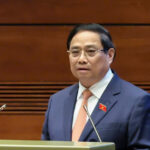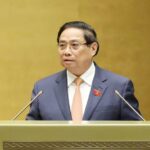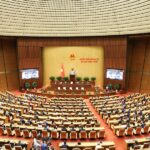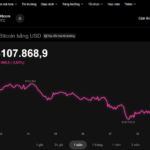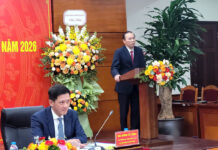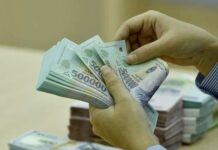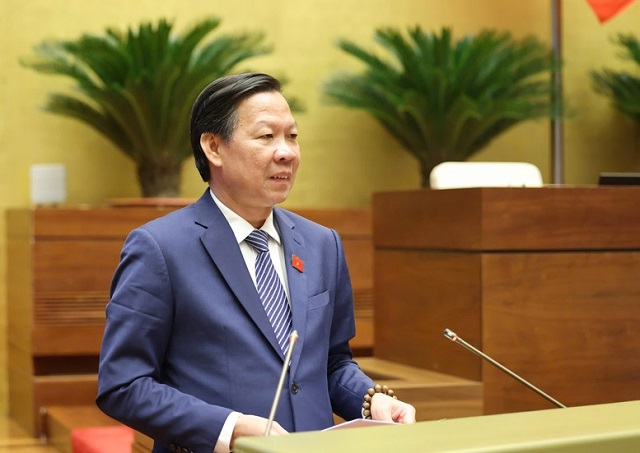
Phan Văn Mãi, Chairman of the National Assembly’s Economic and Financial Committee, presented the review report on the implementation of the 2025 socio-economic development plan and the 2021-2025 five-year plan. Photo: VGP/Nhật Bắc
|
At the opening session of the 10th meeting, after hearing the Prime Minister’s report on the implementation of the 2025 socio-economic development plan and the 2021-2025 five-year plan, as well as the projected 2026 socio-economic development plan, Phan Văn Mãi, Chairman of the National Assembly’s Economic and Financial Committee, presented the review report on these matters.
Comprehensive and Impressive Achievements Across Most Sectors
The Economic and Financial Committee (EFC) affirmed that the 2025 socio-economic development plan and the 2021-2025 five-year plan were implemented amidst significant global volatility, including pandemics, geopolitical risks, strategic competition, and the pressing need for green and digital transformation, all of which placed considerable pressure on growth.
The first two years of the term were severely impacted by the COVID-19 pandemic. However, the final two years, particularly 2025, witnessed historic policy decisions, notably the extensive institutional reforms involving the streamlining of administrative apparatus, the implementation of a two-tier local government model, and significant legal and organizational reforms in private enterprise and strategic infrastructure. These reforms laid the foundation for long-term growth and shaped the nation’s development in the new era.
Vietnam achieved remarkable progress, with comprehensive and impressive results across most sectors. It is projected that 22 out of 26 targets for the 2021-2025 period will be met or exceeded. Specifically, in 2024 and 2025, all 15 targets were fully achieved, demonstrating a strong push in the final two years. Notably, 2025 saw outstanding comprehensive results, with an estimated growth rate of 8%, among the highest in the region. Industries, services, and agriculture all experienced robust growth, maintaining a trade surplus. Macroeconomic stability was maintained, inflation was controlled, and the economy demonstrated resilience, adaptability, and effective macroeconomic policy management.
Institutional frameworks were significantly enhanced, and the two-tier local government model was effectively implemented, paving the way for a streamlined administrative apparatus and improved governance efficiency. Regional connectivity saw qualitative improvements, leading to the formation of urban, industrial, and service clusters linked to the maritime economy and the pilot Da Nang Free Trade Zone.
Strategic infrastructure, particularly highways, experienced a breakthrough. Foreign direct investment (FDI) from 2021 to 2025 accounted for approximately 16% of total social investment, placing Vietnam among the top 15 FDI-attracting countries globally. Policies in education, healthcare, culture, social welfare, ethnicity, and religion were implemented effectively and synchronously. Social welfare was ensured, national defense and security were strengthened, and foreign relations achieved notable successes.
The EFC highly commended the government’s bold, decisive policies, its proactive and flexible management, which led to numerous positive outcomes, surpassing many projections. These achievements established a crucial foundation, bolstered confidence, stabilized the macroeconomy, and created favorable conditions for rapid and sustainable development in the coming period.
Despite these accomplishments, the EFC noted that the economy still faces challenges. Growth momentum remains uneven, and with the current capital market structure and interest rate levels, further monetary policy easing is highly challenging.
To achieve the 2025 and 2021-2025 targets, it is essential to maintain macroeconomic stability, implement prudent monetary policies, and leverage the role of targeted fiscal expansion. Additionally, institutional reforms should be accelerated, traditional growth drivers should be strengthened, and new growth drivers should be developed to ensure sustainable development for the 2026-2030 period.
Broad Agreement on Key Directions and General Objectives
Regarding the 2026 socio-economic development plan, the EFC noted that the global context is expected to remain volatile, complex, and unpredictable. Intensifying strategic competition among major powers, rising geopolitical risks, trade protectionism, supply chain restructuring, and green transition pressures will significantly impact global trade, investment, and growth.
Domestically, 2026 marks the first year of implementing the 2026-2030 five-year socio-economic development plan, initiating a new development phase. This requires proactive, flexible, and creative policy management to maintain macroeconomic stability, control inflation, and create new growth momentum for the subsequent period.
The EFC broadly agreed with the government’s proposed key directions, general objectives, targets, and 11 main task and solution groups.
To focus on core issues for 2026, the EFC emphasized several key tasks and solutions:
First, maintain macroeconomic stability, ensure major balances, and implement flexible, proactive, and prudent fiscal and monetary policies. Guarantee energy, food, and financial security, and effectively manage the gold market.
Continue to unlock capital flows, directing credit to production, business, priority sectors, and growth drivers. Effectively implement policies to upgrade the stock market and establish mechanisms to attract international investment funds.
Second, strengthen the economy’s intrinsic capacity and resilience, increasing domestic localization and value-added. Focus on developing foundational, key, and emerging industries, as well as technology sectors like clean energy, green technology, nuclear, semiconductors, space, and quantum technologies. Enhance productivity, competitiveness, and self-reliance. Promote supporting industries, innovation, digital transformation, and energy transition for modern, sustainable, and technologically self-sufficient production and supply chains.
Third, vigorously develop the domestic market, stimulate consumption, and expand sustainable exports as key pillars to mitigate external risks. Effectively utilize free trade agreements (FTAs), expand markets, and build national brands for key industries, meeting green standards and traceability requirements. Address logistics, infrastructure, and transportation cost bottlenecks to enhance competitiveness and value-added for Vietnamese goods.
Fourth, develop a high-quality workforce, particularly in science, high technology, and foundational fields like electronics, semiconductors, artificial intelligence, smart management, basic sciences, and emerging areas. Align education reforms with market needs, strengthen state-business-training institution partnerships, attract and retain talent, and build a skilled, disciplined, and creative workforce as a key driver for rapid and sustainable growth.
Fifth, invest in synchronized, modern, smart, and interconnected strategic infrastructure, especially key transportation, energy, digital infrastructure, and logistics projects, to enhance regional connectivity. Accelerate public investment disbursement, improve efficiency, and resolve long-standing project bottlenecks. Develop dynamic regions and establish the Ho Chi Minh City and Da Nang International Financial Centers, along with new-generation free trade zones in select localities.
Sixth, develop the private sector as a pillar of sustainable growth. Effectively implement Party and National Assembly resolutions on private sector development, improve institutions, and create a conducive environment. Support domestic enterprises, especially SMEs, households, startups, digital transformation, and global supply chain integration to enhance competitiveness.
Seventh, decisively address institutional and legal bottlenecks, particularly in investment and business, to unleash production potential and mobilize resources. Proactively refine policies, pilot new economic models, and create a legal framework for innovation. Streamline administrative procedures and business regulations, enhance state apparatus efficiency, and resolve overlaps, especially at the local level, while refining the two-tier local government model.
Eighth, ensure comprehensive and synchronized development in culture and society, improve living standards, and safeguard social welfare. Implement policies for beneficiaries, enhance healthcare quality, address climate change, manage disaster risks, and balance economic growth with environmental protection. Strengthen national defense, security, social order, and effective foreign relations to maintain peace, stability, and international standing.
The EFC also proposed that National Assembly delegates focus on discussing the implementation of resolutions on the 2025 and 2021-2025 socio-economic development plans, as well as the projected 2026 plan. This includes assessing the 2025 and 2021-2025 plan implementations, evaluating the achievement of general objectives, key targets, and main tasks and solutions outlined in the resolutions.
Additionally, delegates should analyze the challenges, limitations, causes, and lessons learned during the implementation of these resolutions.
For the 2026 plan, based on the 2025 and 2021-2025 outcomes and domestic and international forecasts, delegates should highlight key policy management considerations for the upcoming period. They should also assess the feasibility of the proposed directions, objectives, targets, tasks, and solutions in the 2026 plan.
– 11:10 20/10/2025
Striving to Commence Construction of the North-South High-Speed Railway by 2026
In the realm of strategic infrastructure development, Prime Minister Pham Minh Chinh has outlined ambitious plans. These include accelerating the implementation of the Lao Cai – Hanoi – Hai Phong railway line, as well as railway connections with China and urban rail projects in Hanoi and Ho Chi Minh City. A key highlight is the targeted commencement of the North-South high-speed railway in 2026.
Prime Minister: Vietnam’s Per Capita GDP Projected to Reach $5,400–$5,500 by 2026
In presenting the projected socio-economic development plan for 2026, Prime Minister Phạm Minh Chính outlined ambitious targets: a GDP growth rate of 10% or higher, per capita GDP reaching $5,400–$5,500, and an average CPI increase of around 4.5%. These goals are supported by ten key task groups and primary solutions.
Unveiling the Rising Real Estate Tycoon Quietly Partnering with Vinhomes, Ecopark, and Phú Mỹ in Billion-Dollar Projects
Recently, Nomura Real Estate Development has been quietly expanding its presence in Vietnam through a series of notable projects, including Ecopark, Vinhomes Grand Park, Vinhomes Royal Island, and Hồng Hạc City.


























